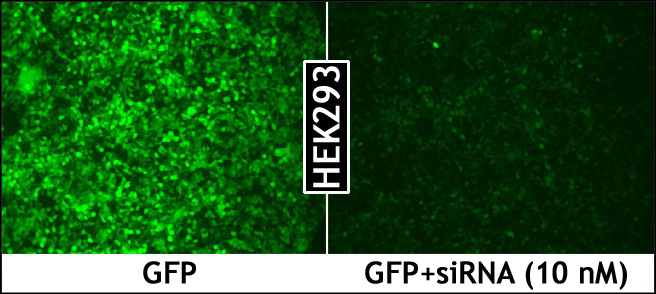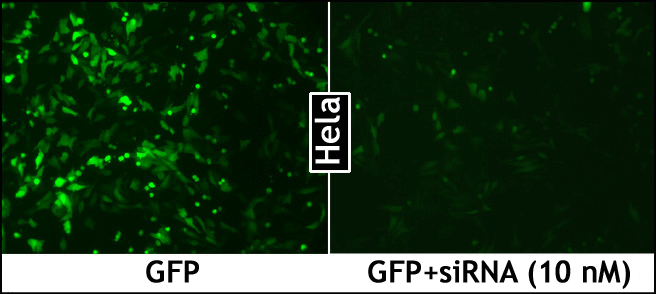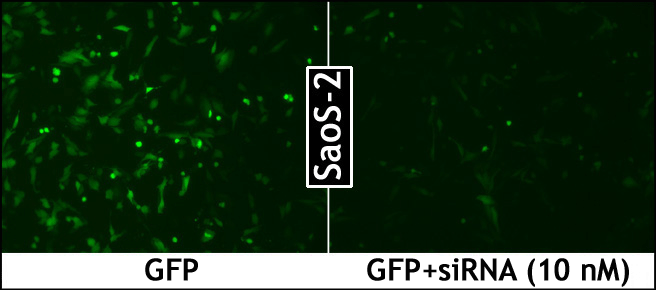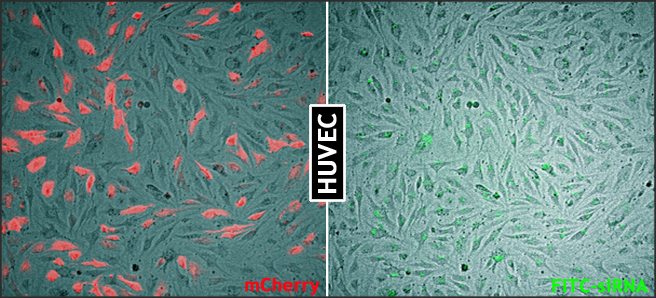EGFIE LLC
We always add value to our customers
Search by Keyword
Product Categories
Description:
Based on our innovative and proprietary lipid-conjugation technology, LipoJet™ Transfection Kit, formulated from novel fluorinated cationic lipids, exhibits significant difference from other lipids transfection reagents in the market. LipoJet™ Transfection Kit is the most powerful yet very gentle gene delivery tool for a variety of applications including plasmid DNA and/or siRNA for most of mammalian cell types. Compared with leading products in the market, LipoJet™ is more cost-effective and always provides higher transfection efficiency with less cytotoxicity.
Kit content:
- LipoJet™ Reagent, 1.0 ml sufficient for 1000 DNA transfections and 1000 siRNA transfections (24-well plate).
- LipoJet™ Transfection Buffer (5x ), 8.0 ml to make 40 ml of working solution (1x ).
Features:
- Versatile: DNA transfection, siRNA transfection and DNA/siRNA co-transfection.
- Powerful: Outstanding efficiency on adherent cells.
- Extremely low toxicity: Improve Cell viability after transfection
- Economical: More transfections with less reagent
- Easy to use: One tube reaction and compatible with serum/antibiotics.
- Suitable for high-throughput application
Storage:
Store at 4 °C. If stored properly, the product is stable for 12 months or longer.
Broad Transfection Spectrum for Mammalian Cell Types
|
Cell Line |
DNA Transfection |
siRNA Transfection |
|
293, 293T |
85% |
- |
Examples Showing Excellent DNA and siRNA Transfection Efficiency of LipoJet™ In Vitro Transfection Kit

A efficiency comparison of LipoJet™ reagent vs. brand name products to transfect Hela, Cos-7, NIH-3T3, CHO and HEK293 (left panel) and Cos-7 (right panel). pEGFP-N3 cDNA (0.5 µg/well of 24-well plate) was transfected into different mammalian cells per the standard transfection protocols in presence of serum (10% FBS) and antibiotics as recommended by manufacturers. The transfection efficiency were analyzed via FACS 48 hours post transfection.

A toxicity comparison of LipoJet™ reagent vs. brand name products to transfect Hela cells. pEGFP-N3 cDNA (1.0 µg/well of 24-well plate) was transfected to Hela cells per the standard transfection protocols in presence of serum (10% FBS) and antibiotics as recommended by manufacturers. The MTT assay (right panel) and phase contrast imaging (left panel) were used to analyze the cell viability 48 hours post transfection.

A comparison of LipoJet™ reagent vs. Lipofectamine 2000 (L2K) and PolyJet™ transfection reagent on HEK293T cell.pEGFP-N3 cDNA (0.125 µg/well, 0.25 µg/well and 0.5 µg/per well of 24-well plate) was transfected into 293T cells using the standard transfection protocols in presence of serum (10% FBS) with LipoJet™ (upper panel at LipoJet™/DNA (µl/µg) ratio=2), L2K (middle panel at L2K/DNA (µl/µg) ratio=3) and PolyJet™ (lower panel at at PolyJet™/DNA (µl/µg)ratio=3) respectively. The cells were visualized by Nikon Eclipse Fluorescence microscope 48 hours post transfection.

A comparison of LipoJet™ reagent vs. Lipofectamine 2000 (L2K) and PolyJet™ transfection reagent on Hela cell. pEGFP-N3 cDNA (0.125 µg/well, 0.25 µg/well and 0.5 µg/per well of 24-well plate) was transfected into Hela cells using the standard transfection protocols in presence of serum (10% FBS) with LipoJet™ (upper panel at LipoJet™/DNA (µl/µg) ratio=2), L2K (middle panel at L2K/DNA (µl/µg) ratio=3) and PolyJet™ (lower panel at at PolyJet™/DNA (µl/µg)ratio=3) respectively. The cells were visualized by Nikon Eclipse Fluorescence microscope 48 hours post transfection.



Exceptional gene silencing of LipoJet™ reagent during DNA/siRNA co-transfection on mammalian cells. Transfection of GFP cDNA (left panel, 0.25 µg per well of 24-well plate) and co-transfection of GFP cDNA ( 0.25 µg per well of 24-well plate) and GFP targeted siRNA (final 10 nM, right panel) with LipoJet™ reagent leads to exceptional gene silencing on HEK293 (upper panel), Hela (middle panel) and SaoS-2 (lower panel) cells respectively. The cells were visualized by Nikon Eclipse Fluorescence microscope 48 hours post transfection.

Exceptional DNA/siRNA co-transfection efficiency on HUVEC. Co-transfection of mCherry cDNA (0.10 µg per well of 24-well plate) and FITC conjugated siRNA (final 30 nM per well of 24-well plate) to HUVEC with LipoJet™ reagent gave rise to 60% mCherry+ (phase contrast overlapped with mCherry imaging, left panel) and nearly 100% FITC-siRNA+ (phase contrast overlapped with FITC imaging, right panel) HUVEC 24 hours after transfection. The pictures were given from Dr. Pan Kong of USC as courtesy.


Excellent silencing of endogenously expressed KIF11 (also known as EG5) in HEK293 (upper panel) and Hela (lower panel) cells with LipoJet™ reagent at 10 nM EG5 siRNA. KIF11 (also known as EG5) encodes a motor protein that belongs to the kinesin-like protein family involved in chromosome positioning and bipolar spindle formation during cell mitosis. A reduction in KIF11 levels causes mitotic arrest. LipoJet™ reagent effectively delivers EG5 siRNA (final 10 nM) to HEK293 and Hela cells, leading to more than 80% of "round-up" phenotype of HEK293 and Hela cells 24h post transfection over negative control (final 10 nM with sham EG5 siRNA). The phenotype of "rounded-up" HEK293 and Hela cells were visualized 24h post transfection with a Nikon microscope.
Data Sheet & Protocol:
- A Protocol for DNA and siRNA Transfection ![]()
- A Short Protocol for DNA Transfection ![]()
- A Short Protocol for siRNA Transfection ![]()
- A Protocol for DNA/siRNA Co-transfection ![]()
- Technical Note & Transfection Tips ![]()
Shopping Basket
| Items: | 0 |
| Subtotal: | $0.00 |
customer@egfie.com